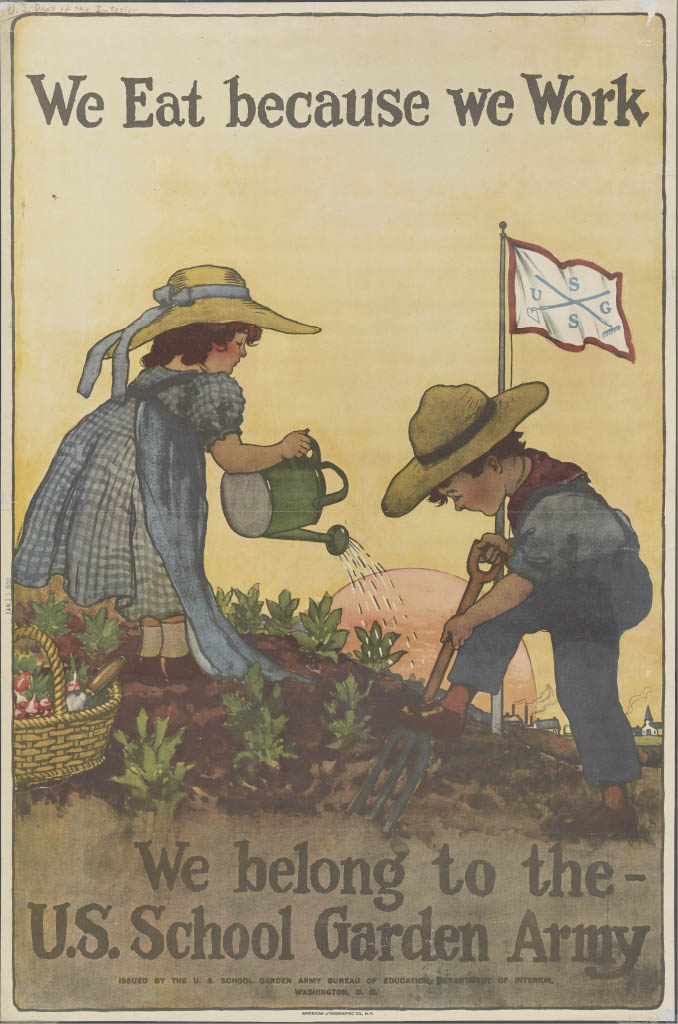|
As I delve deeper into research on the farm labor shortage for my book, I'm starting to realize that the main theme of the home front in the First World War is that there were a whole bunch of people doing largely the same thing at the same time, and it wasn't until really the end of 1917 into 1918 that government agencies figured things out enough to actually get everyone properly organized. This poster is just one example of that. "We Eat Because We Work," a poster featuring cherubic White children digging and watering what are presumably radishes (judging by the contents of the basket) on a sunny hillside overlooking a flag flying not the American flag, but one of the United States School Garden Army, reads a little more ominously in the context of say, Nazi Germany, or Orwell's 1984. But when the U.S. School Garden Army was founded, and likely when this poster was produced, terms like "dictator" and "propaganda" had far more innocent meanings. Still, this poster does seem to imply, consciously or not, that children who do NOT work, will NOT get to eat. I doubt it was meant that way. Instead, like many propaganda posters of the First World War, it was meant to inspire people to participate. This poster sent me down the rabbit hole a bit, in part because the online history of The United States School Garden Army was so vague, and I'm a stickler for exact dates. Rose Hayden-Smith has written about the United States School Garden Army, but even she isn't super clear on when exactly the "army" was founded. The Farm Cadet program, which literally "enlisted" high school-aged boys into farm work on military-style camps, was founded in New York State in April of 1917, just days after the United States entered the war. A May 5, 1917 article in the New York Times mentions the "National School Children's Garden League," but only to mention a fundraiser for the league. It's the only reference I've been able to find of that organization. By June, 1917, Port Jervis, NY is discussing school gardens in conjunction with the Farm Cadet program, but school gardens as pedagogy had been popular throughout the Progressive Era. It seems that despite claims online that the United States School Garden Army was founded in 1917, it wasn't until March of 1918 that the USSGA was official. The Newburgh, NY Daily News published "Millions of Children to Enlist in Nation's School Garden Army" on March 20, 1918. The article suggests that this is a brand new endeavor, mentioning several times that this "new army" and "plans" "will begin soon." The "draft" age for the United States School Garden Army was 9-16 years old, both boys and girls. The cut-off age of 16 was so that boys aged 16 and older could participate in the Farm Cadet program. This poster features children who look younger than nine years old, but perhaps young cherubs were more attractive models than gangly pre-teens. As Hayden-Smith argues, the United States School Garden Army was designed to turn children from consumers into producers, at least temporarily. Critiques of the use of child labor were assuaged by assurances that the work would be for no more than a few hours a day, and always supervised by teachers or other staff. The work of the USSGA continued for several years after the war, still going strong in 1919 and 1920, likely because the High Cost of Living was keeping food prices up, and school gardens raised produce to be consumed by students on site, thus lowering school cafeteria costs. In fact, most of the articles from late 1919 and early 1920 talk about the financial benefits of the school gardens, in addition to the social and emotional benefits. In today's context, the discussion of the financial benefits of child labor seems mercenary, at best, but the school garden movement did have social and emotional benefits as well - being out-of-doors, the "stick-with-it-ness" of tending living things, and the rewards of getting to eat the results of your hard work. School garden programs that help provide for school cafeterias have been revived in recent years as a way to engage students with "real" food and create affordable access to fresh, local fruits and vegetables, especially in areas of food deserts. But growing school gardens isn't cheap, nor is it easy. In much of the nation, the best garden growing months are when school is not in session. In World War I, teachers and students gave up part or all of their summers for the war effort. In today's world, the garden manager usually does the bulk of the work over the summer. Regardless, the work of school gardens during the First World War does seem to have been a relative success. As I research more, I'll delve deeper into school gardens, so stay tuned! The Food Historian blog is supported by patrons on Patreon! Patrons help keep blog posts like this one free and available to the public. Join us for awesome members-only content like free digitized cookbooks from my personal collection, e-newsletter, and even snail mail from time to time! Don't like Patreon? Leave a tip!
0 Comments
|
AuthorSarah Wassberg Johnson has an MA in Public History from the University at Albany and studies early 20th century food history. Archives
July 2024
Categories
All
|


 RSS Feed
RSS Feed